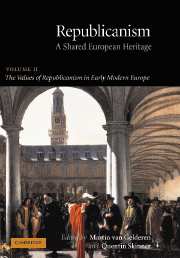Book contents
- Frontmatter
- Contents
- Contents of Volume I
- Acknowledgments
- Introduction
- Part I Republicanism and Political Values
- 1 Classical Liberty and the Coming of the English Civil War
- 2 Empire and Liberty: A Republican Dilemma
- 3 Republicanism and Toleration
- 4 The Mechanisation of Virtue: Republican Rituals in Italian Political Thought in the Sixteenth and Seventeenth Centuries
- 5 From Virtue to Politeness
- 6 From Civism to Civility: D'Holbach's Critique of Republican Virtue
- Part II The Place of Women in the Republic
- Part III Republicanism and the Rise of Commerce
- Bibliography
- Contributors
- Index of Names of Persons
- Index of Subjects
1 - Classical Liberty and the Coming of the English Civil War
Published online by Cambridge University Press: 11 January 2010
- Frontmatter
- Contents
- Contents of Volume I
- Acknowledgments
- Introduction
- Part I Republicanism and Political Values
- 1 Classical Liberty and the Coming of the English Civil War
- 2 Empire and Liberty: A Republican Dilemma
- 3 Republicanism and Toleration
- 4 The Mechanisation of Virtue: Republican Rituals in Italian Political Thought in the Sixteenth and Seventeenth Centuries
- 5 From Virtue to Politeness
- 6 From Civism to Civility: D'Holbach's Critique of Republican Virtue
- Part II The Place of Women in the Republic
- Part III Republicanism and the Rise of Commerce
- Bibliography
- Contributors
- Index of Names of Persons
- Index of Subjects
Summary
A good place to begin this chapter – and indeed this entire volume on republican values – is with the rubric De statu hominis from the opening of the Digest of Roman law, perhaps the most influential of all the classical discussions of the concept of civil liberty. There we read that ‘the fundamental division within the law of persons is that all men and women are either free or are slaves’. After this we are offered a formal definition of the concept of slavery. ‘Slavery is an institution of the ius gentium by which someone is, contrary to nature, subjected to the dominion of someone else.’ This in turn is said to yield a definition of individual liberty. If everyone in a civil association is either bond or free, then a civis or free subject must be someone who is not under the dominion of anyone else, but is sui iuris, capable of acting in their own right. It likewise follows that what it means for someone to lack the status of a free subject must be for that person not to be sui iuris but instead to be sub potestate, under the power or subject to the will of someone else.
While this summary was exceptionally influential, we already encounter a very similar analysis at a much earlier date among the historians and philosophers of ancient Rome, and especially in the writings of Cicero, Sallust, Livy and Tacitus.
- Type
- Chapter
- Information
- RepublicanismA Shared European Heritage, pp. 9 - 28Publisher: Cambridge University PressPrint publication year: 2002
- 12
- Cited by



